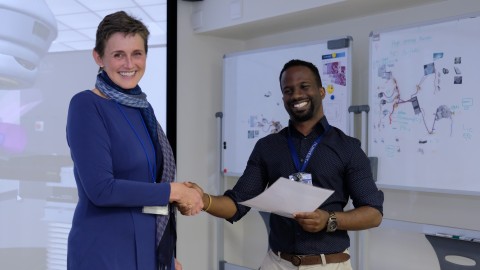WASHINGTON D.C.--(BUSINESS WIRE)--Today marks the official introduction of Global Access to Cancer Care Foundation (GACCF) www.globalaccf.org with a worldwide initiative to provide training, access and hope where there was none before through its oncology education programs in low and middle-income countries (LMICs) in South America, Africa, South, and East Asia.
GACCF helps cancer care professionals expand their knowledge base by implementing and overseeing training courses and workshops that enhance cancer treatment through radiotherapy to destroy cancer cells – an essential component required in more than 50 percent of all cancer patients, along with surgery and chemotherapy. An increase in radiotherapy training can ultimately result in increased positive patient outcomes.
It is estimated that by 2030 there will be a projected 23.6 million cancer cases around the world. Most of these will occur in low-and middle income countries in Asian, African and South American countries that are unable to offer proper treatment and care. Worldwide, 70 percent of all global deaths from cancer occur in LMICs and 60 percent of the world’s total new cancer cases are diagnosed in developing countries.
“What sets GACCF apart is our ability to develop and empower cancer care professionals in-country to help save patient lives and beat cancer,” said Tonya Steiner, Executive Director of Global Access to Cancer Care Foundation. “ We are providing much-needed cancer treatment education for medical specialists and creating access to life-saving treatments to areas of the world with limited access to essential medicines and services, resulting in a disproportionate increase in cancer mortality. We train specialists to treat people in places where cancer patients are diagnosed and treated in facilities that often lack advanced diagnostic capabilities, imaging modalities, as well as advanced software technologies. We also provide support and personal care needed to increase positive patient outcomes.”
Over the past decade, population demographic changes and progress on controlling communicable diseases such as HIV/AIDS, malaria, and tuberculosis in LMICs around the globe has coincided with the rise of cancer in these communities. State-of-the-art cancer care is not available in many of the world’s LMICs because of high investment costs and high resource-demand. In LMICs, cancer centers often use outdated equipment and simplified techniques.
“GACCF provides high-quality teaching and training in radiotherapy that is helping to address the global burden of cancer in areas that are underserviced,” said Jeannette Parkes, Professor and Head of Division Radiation Oncology, Groote Schuur Hospital and the University of Cape Town, South Africa. “Teaching radiotherapy professionals in Africa is going to be one of the key components of world cancer care in the upcoming two decades. Treating patients with this technology is required in about half of cancer patients and is a cost-effective way to treat cancer. We don’t have long-term survival without it. Using high-quality radiotherapy also means our patients experience fewer side effects and that’s what we aim for.”
About Global Access to Cancer Care Foundation:
The Global Access to Cancer Care Foundation (GACCF) offers training, technology, access, and hope; specifically, for low and middle-income countries (LMICs) in South America, Africa, South, and East Asia. The foundation’s cancer care professionals help to implement and oversee training courses and workshops in collaboration with local partners such as universities, hospitals or governmental institutions that enhance cancer treatment through radiotherapy treatment. The aim of these regional programs is to overcome the lack of trained professionals who treat cancer patients in the near term. By empowering local faculty to deliver training, the GACCF education programs encourage self-reliance and sustainability. To support the success of these programs, the GACCF provides project management, financial support, and professional teams from within and outside the region. For more information visit: www.globalaccf.org.




